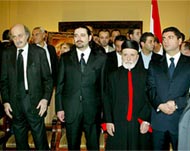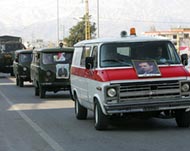Karami in seclusion, impasse persists
Lebanon’s Prime Minister-designate Umar Karami has gone into seclusion while the country awaits news of formation of a new government.

Aljazeera’s correspondent in Beirut, Abbas Nasir, reported on Tuesday that Karami was not answering his mobile phone and was absent from official meetings.
He had not even met his colleagues, the correspondent said.
Government formation has been held up apparently due to differences among Karami, President Emile Lahud and parliament Speaker Nabih Birri.
The delay could result in crucial legislative elections being put off.
A source close to Karami told Aljazeera Karami’s self-enforced political seclusion might last two or three days.
Cooperation sought
 |
|
Opposition leaders say the delay |
Karami had announced he would form a national unity government, but only with the cooperation of other political parties.
If the cooperation was not forthcoming on the issue of the electoral law and distribution of ministerial portfolios, Karami could decline to form the government.
If Karami carried out his threat, it would push Lebanon into a crisis, his colleagues say.
“According to the law, voters should be called to the polls at least one month before the end of the term of the outgoing parliament” which expires at the end of May, legislator Ghasan Mukhaibar said.
Institutional vacuum
Time was running short, Mukhaibar warned, “unless the polls are held on one day, which is technically very difficult” in a country where elections are traditionally carried out over several consecutive weekends.
 |
|
Political divisions remain deep |
Mukhaibar is a well-known lawyer and a member of the Lebanese Transparency Association, a body working on electoral transparency.
For his part, Cardinal Nasr Allah Sufair, head of the powerful Maronite church and a spiritual guide for the Christian opposition, warned that repeated delays are creating an institutional vacuum.
“After the extension of the term of President Emile Lahud (in September), we are moving towards the extension of the term of the parliament,” he said.
Under pressure from pro-Syrian parties, Karami said he intended to retract from parliament a proposed draft law for the forthcoming elections, based on small constituencies as requested by the opposition.
Christian fears
The opposition says smaller districts provide for more balanced elections that would not allow minority Christian voters to drown in the Muslim majority.
The 128-member parliament was last elected in 2000, generally on the basis of larger constituencies, which allowed the election of a house largely dominated by Syria‘s allies – including Christians.
The international community – mainly the United States, France and the United Nations – have repeatedly called for polls to be held on time after Syria completes its troop pullout from Lebanon by 30 April.